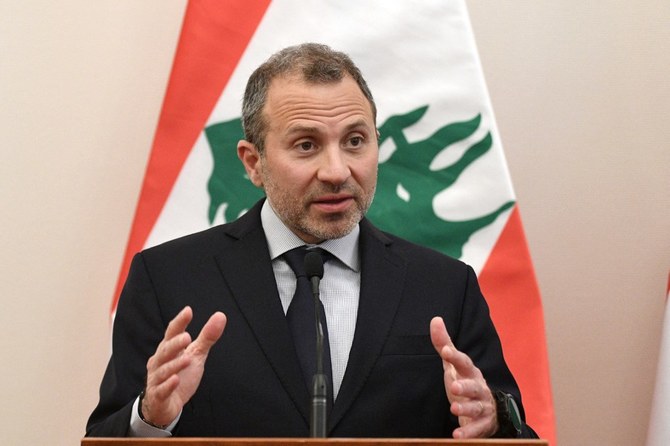
PARIS, (Reuters) By John Irish — Senior Lebanese politician Gebran Bassil said on Thursday he was working to find a compromise candidate for the presidency who would be able to push through crucial reforms, but that he would run for the post himself if he deemed a chosen candidate a bad option. Lebanon has had neither a head of state nor a fully empowered Cabinet since Michel Aoun’s term as president ended on Oct. 31 – an unprecedented vacuum even by the standards of a country that has enjoyed little stability since independence. The vacuum marks a new phase in the crisis that has hit Lebanon since its financial system collapsed in 2019, impoverishing a large swath of people, paralysing banks and fuelling the biggest wave of emigration since the 1975-1990 civil war.
The presidential post is reserved for Christians, but part of the standoff reflects rivalries among the community as well as crucial political and religious balances in the country. “I am the head of the biggest parliamentarian bloc and it is my total right to be the candidate and promote myself but I see that the existence of Lebanon is much more important than this and it’s now the existence of Lebanon that is at stake,” Bassil, a Maronite Christian, who is one Lebanon’s most influential politicians, told Reuters in an interview. “I took the decision not to present myself in order to avoid the vacancy and facilitate the process of ensuring a good profile with a high possibility of success. I did not do this to have the vacancy and a bad person to fill the void,” he said. “I will not accept to have a bad president and in that case of course I would run.” With politicians showing no compromise in a tussle over state power, some political sources and analysts say a compromise on the presidency may demand the type of foreign mediation that has saved Lebanon from such standoffs previously.
Bassil said he was in Paris as part of a broader effort to create a framework that could be agreed domestically and internationally that would ease the process for the new president to push through crucial economic reforms without the repeated blockages of the past. France has spearheaded international efforts to rescue Lebanon from its deepest crisis since the civil war, but to no avail. Bassil, who won plaudits for playing a behind-the-scenes role in U.S.-brokered talks to delineate Lebanon’s maritime boundary with Israel by liaising with Hezbollah, said he hoped a breakthrough on the presidency could be achieved by the end of the year, but that even that was “dangerous” in terms of delays. “Frankly, if what we are trying to do does not succeed, I don’t see a chance in the near future and the vacancy may last for a long time,” he said. “That’s why the country can’t take this and live with it so we need to succeed in finding a solution.”
Lebanon MPs fail to elect a president for the sixth time
by newarab.com — Lebanese lawmakers failed for a sixth time Thursday to elect a successor to former president Michel Aoun, whose mandate expired last month, highlighting deep divisions in the crisis-hit country. Parliament is split between supporters of the powerful Iran-backed Hezbollah movement and its opponents, neither of whom have a clear majority. Lawmaker Michel Moawad, who is seen as close to the United States, won the support of 43 of parliament’s 128 MPs. But his tally was outnumbered by the 45 blank ballots cast by pro-Hezbollah lawmakers and fell well short of the margin needed for victory.
In other news, Lebanon failed to elect a president for the sixth time. It’s truly a weekly ritual at this point. — Danny Hajjar داني حجار (@DanielGHajjar) November 17, 2022 “It’s a complete deadlock,” independent lawmaker Mark Daou told AFP. “We will not have a president before next year.” In each of the six sessions convened to elect a new president so far, the pro-Hezbollah bloc has walked out before lawmakers could hold a second round of voting which would have reduced the number of ballots needed for victory from 86 to 65. Lawmaker Ali Hassan Khalil of the Hezbollah-allied Amal movement said the bloc had adopted the tactic because it was “impossible to elect a president without a consensus among lawmakers”. Moawad’s candidacy is opposed by Hezbollah, whose leader Hassan Nasrallah called last week for a president ready to stand up to the United States.
Aoun’s own election in 2016 followed a more than two-year vacancy at the presidential palace as lawmakers made 45 failed attempts before reaching a consensus on his candidacy. But this year’s vacancy comes as Lebanon is mired in an economic crisis that the World Bank has dubbed one of the worst in recent history. But since May Lebanon has had only a caretaker government that lacks the authority to push through the sweeping reforms demanded by the International Monetary Fund as a condition for releasing billions of dollars in emergency loans.



